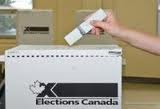2011-04-29 Canadians plot to bring down a government they haven't voted for yet #Elxn41 #wlcan #Cdnpoli
 As pollsters and pundits all agree that none can guess what the votes, much less the seats will look like after the May 2 election, almost all of the possibilities are anything but straightforward. A Conservative majority would be straightforward, and may happen. Ontario controls 106 of Canada's 308 seats and is subject to a three way vote split in many ridings. The latest EKOS seat projection states it is conceivable that the Conservatives could back into a majority with just slightly more than one-third of the overall votes. This would see the Conservatives in power until they call another election.
As pollsters and pundits all agree that none can guess what the votes, much less the seats will look like after the May 2 election, almost all of the possibilities are anything but straightforward. A Conservative majority would be straightforward, and may happen. Ontario controls 106 of Canada's 308 seats and is subject to a three way vote split in many ridings. The latest EKOS seat projection states it is conceivable that the Conservatives could back into a majority with just slightly more than one-third of the overall votes. This would see the Conservatives in power until they call another election.
Other than that, here are the options likely now:
1. The Conservatives win a minority government. This we have seen for five years. The Conservatives will then be open to another non confidence vote, which may bring their government down for a third time. They were not able to pass their budget in March so would probably have to bring it before the House soon. Or not. One idea from Murray Dobbin:
A number of constitutional experts are already mulling over the possibility of what some refer to as a kind “informal constitutional coup” - Harper refusing to accept the results of a non-confidence vote. According to a Hill Times story quoting University of Ottawa constitutional law expert Errol Mendes, ignoring such a vote “…would amount to a sort of informal constitutional coup. Essentially that position he’s taking is he’s not the Prime Minister shackled by the will of the people, he’s the elected president of Canada.”
Queen’s University professor Ned Franks, stated: “If it’s early in the new Parliament, if it’s a defeat on a vote of confidence, the Governor General is entitled to inquire whether there is another person who would enjoy the confidence of the House.”
But Harper could delay the opening of Parliament, funding the government with special warrants through Order in Council and the Governor General. Running the government in this manner for six or eight months would provide Harper with the argument that the opposition parties were simply conspiring to defeat a government that had been functioning effectively for many months. And he then refuses to go.
2. A party that is not the conservatives wins a minority government. Usually, this means that party will govern. But the Conservatives still have the option (and there is a good chance it would be exercised) of facing the House in a post election confidence vote instead of leaving quietly.
The outcome of any minority scenario is going to depend on the third place party, now looking to be the Liberals, who may have made themselves the most powerful party in Canada by dropping to third. Most pundits agree that convincing the Liberals to accept third place, and drop from "Canada's natural ruling party" to support the NDP in a coalition government would be difficult. But within the eroded ranks of the Liberals, there are people who are violently against supporting the NDP and others who are violently against supporting the Conservatives. If the Liberal leader attempts a coalition with either the NDP or the Conservatives, he risks having a large number of MP's cross the floor or risk losing the support of their constituents.
May should be interesting.